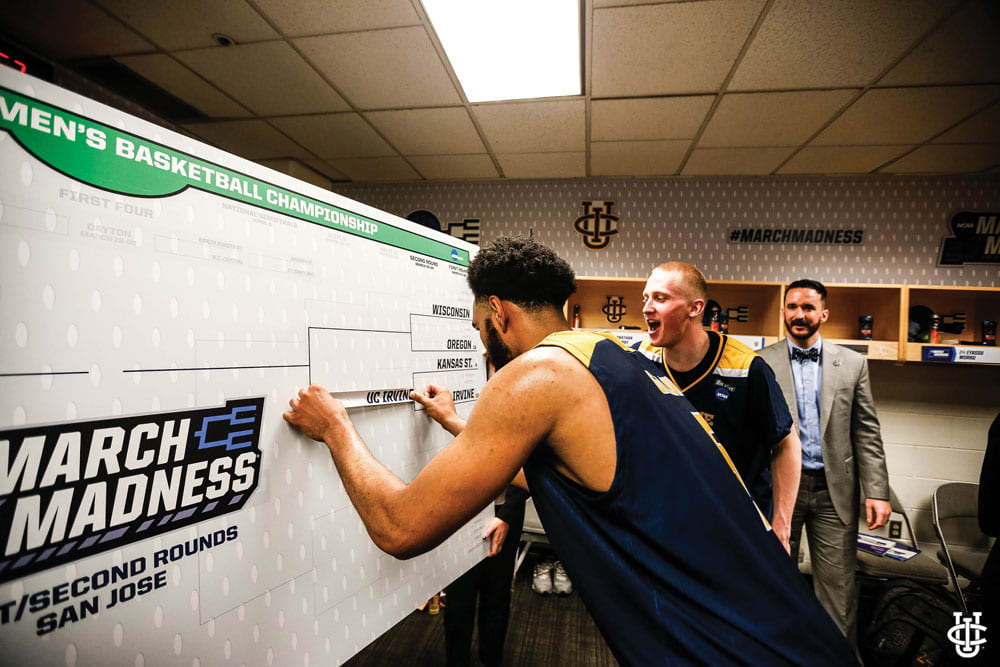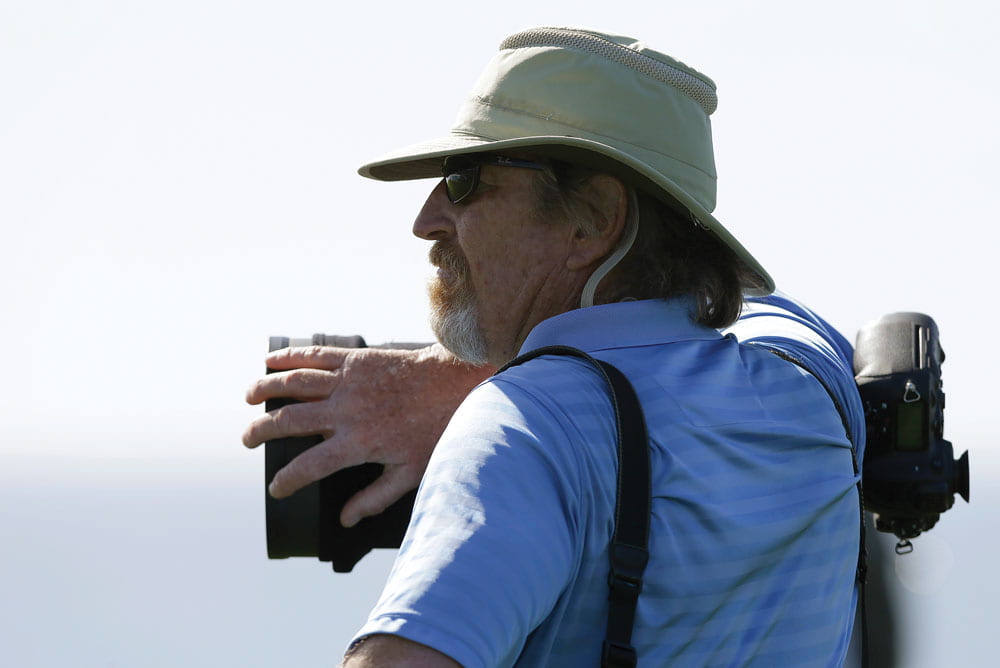UCI Athletics Reveling In Its Shine
Historic March Madness win puts spotlight on a rich sports program that prides itself on making champions both on and off the court
“One Shining Moment,” a musical tribute played over a video montage of NCAA men’s basketball tournament highlights at the conclusion of the annual March Madness-capping championship game telecast, included a magical UCI moment.
After the No. 13-seeded Anteaters achieved the most noteworthy victory in the program’s history by upending No. 4-seeded Kansas State (70-64) in the first round of the South Regional on March 22, UCI joined basketball blue bloods Duke, Kentucky, Kansas and North Carolina in the reflective consciousness of one of college athletics’ most heralded events.

The Kansas State triumph, followed two days later by a second-round loss to No. 12-seeded Oregon, gave coach Russell Turner’s now perennial Big West Conference champions a school-record 31 wins. It also topped more than a week of revelry that enveloped and elevated ’Eater Nation into the media spotlight. Fans caught the excitement too: A GIF of mascot Peter the Anteater doing the popular floss dance got over 25 million views.
It was hardly the first such visible exposure for athletics at UCI, a so-called “hidden” jewel that may not boast a football team but has captured 28 national championships in nine sports, including four NCAA men’s volleyball titles in a seven-year span, capped by back-to-back crowns in 2012 and 2013.

But Turner, a former assistant coach at Stanford and Wake Forest, as well as with the NBA’s Golden State Warriors, clearly savored guiding UCI to its second NCAA Tournament appearance. He also choreographed UCI’s first Big Dance, which featured a first-round near upset of No. 4-seeded and three-time national champion Louisville, in 2015.
“It’s meaningful to be on this platform,” Turner told assembled media in San Jose before the 2019 tournament began. “People joked in 2015 that we had put UC Irvine on the map. I always said, ‘No, we didn’t put [the Anteaters] on the map, but we put them on the bracket. And a lot of people notice when you’re on the bracket.’”
“It gives an opportunity for our university to have positive exposure through incredible representatives of our place, and that’s our players. I’m excited for that,” he added. “It is satisfying not just for our players, but for our fans and our community. This is special.”
Most Brilliant Moment
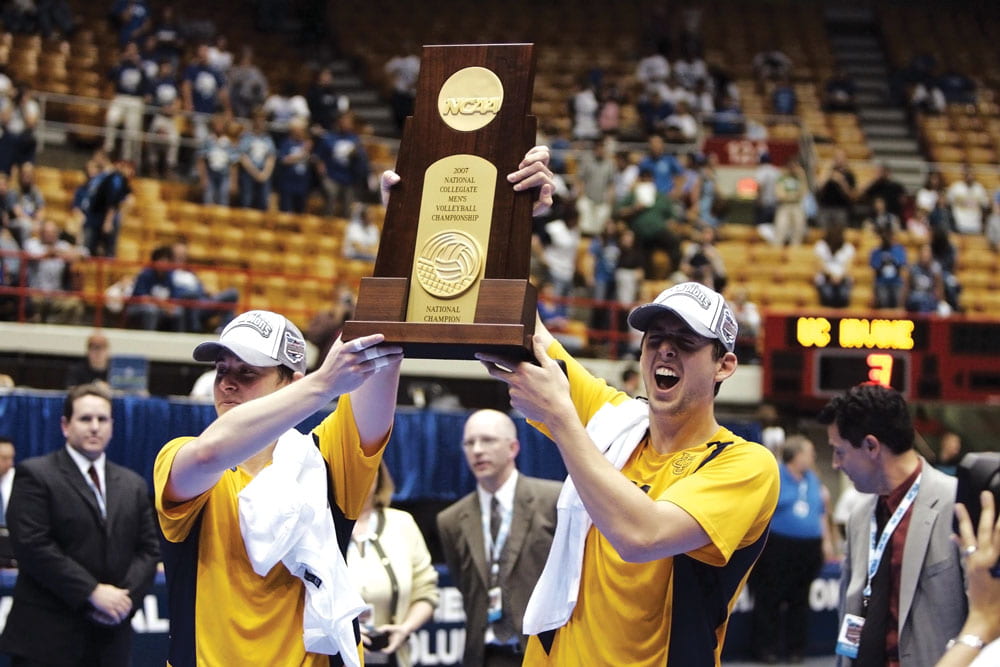

Perhaps the most gleaming spotlight to be trained upon UCI Athletics was in 2007, the year the Anteaters collected the Division I-AAA Athletic Directors Association All-Sports Trophy, given annually to the best all-around sports program among non-football schools.
One season after making its NCAA Final Four debut in 2006, then-UCI coach John Speraw’s men’s volleyball team defeated Indiana-Purdue Fort Wayne in four sets to win the program’s first national title.
The very day the triumphant volleyball squad was being saluted at the White House, UCI’s baseball team, competing in its first College World Series, earned a nearly six-hour, 13-inning victory over rival Cal State Fullerton in what was at the time the longest game in CWS history.
Then-baseball coach Dave Serrano’s players – representing a program reinstated just eight years earlier by a student referendum that had halted nine seasons of baseball dormancy – went on to finish in the top four in Omaha. The Anteaters, who claimed NCAA Division II baseball championships in 1973 and 1974, have consistently shone on the diamond since, including a top national ranking in 2009 and another College World Series appearance in 2014.

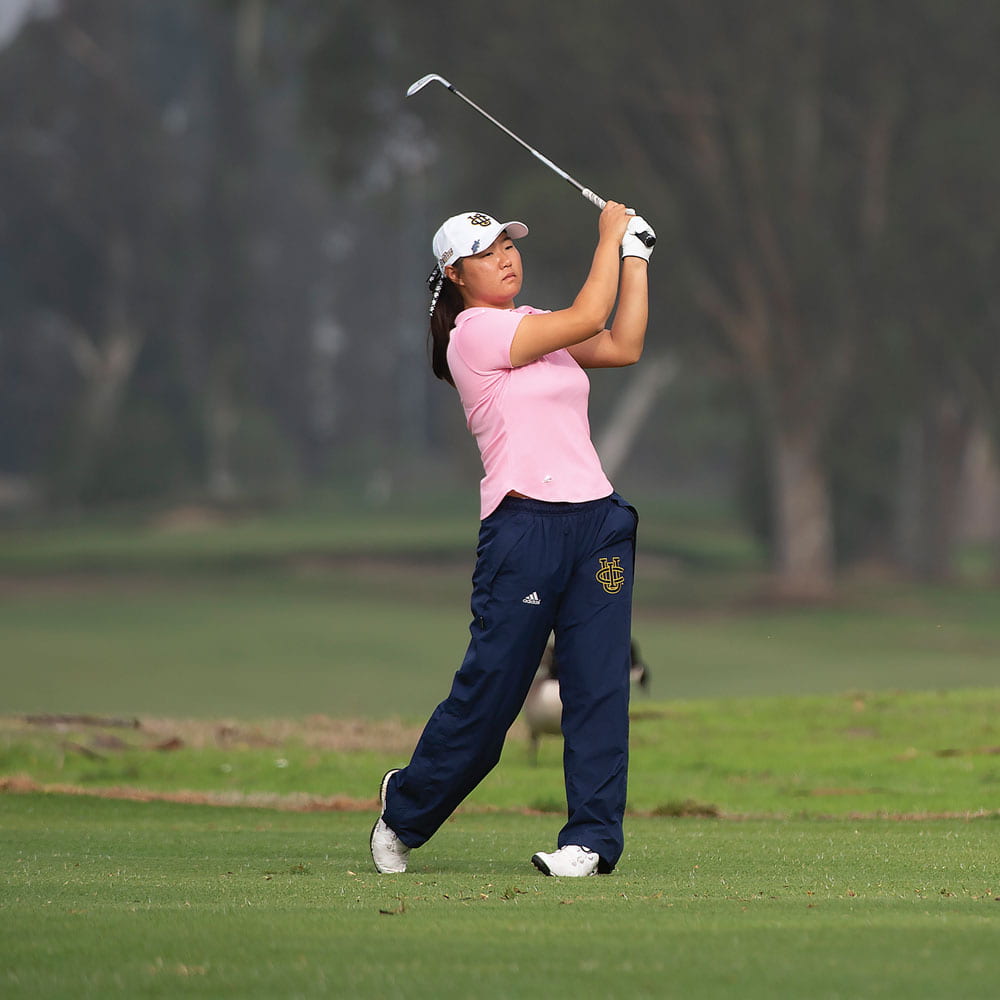
Despite being known more, perhaps, for scholars than ballers, UCI – which jumped from the Division II ranks to Division I in 1977-78 – has also earned six NCAA crowns in men’s tennis, three each in men’s water polo and men’s swimming, two in men’s cross country and one in men’s golf. In addition, the campus has produced six national titles in sailing and 540 All-Americans, as well as enough Olympians to outnumber the individual roster allotments for all of its current men’s and women’s sports.
The UCI undergraduate student body passed the Athletics and Student Activities Referendum in 1999, which besides bringing back baseball, introduced women’s water polo and women’s golf – two of the most successful women’s programs. Women’s water polo has won seven Big West Championships and made six NCAA appearances, while women’s golf has captured five Big West titles and made three NCAA appearances.
What’s more, 15 of the 18 current UCI programs have snagged regular season championships. One of them, women’s basketball, won the Big West Tournament Championship to advance to the NCAA Tournament.
Making the Grade

While proud of their student athletes’ excellence in the athletic arena, UCI coaches are equally pleased by their passionate pursuit of academics.
“UCI has so many things to offer,” says women’s golf head coach Julie Brooks. “We recruit competitive athletes who also thrive in the classroom. Competing at the highest level, whether on the course or in the classroom, is what makes UCI impressive. World-class academics, the location, the facilities and a staff committed to the ultimate student-athlete experience – what more could you ask for?”
Jenna Phreaner, a senior goalkeeper for the women’s water polo team, says that competing in the pool has helped raise her level of academic achievement at UCI.
“The way our coach [Dan Klatt ’01] arranged our schedule, he really does put academics at the forefront,” says the psychology & social behavior major, who plans to go to either physician assistant school or medical school. “In terms of us being athletes at a relatively elite level, I feel like we don’t have a disadvantage in academics. Once I got to UCI, the support for the student-athlete, the resources I was given and the structured schedule that I had really promoted my best learning. It was important that I perform well academically not only to my family, but also to my coach and the culture we had on our team.”
Phreaner, MVP of the 2018 Big West women’s water polo tournament, says that she appreciates her decision to attend UCI even more now that she has had some time to experience first-hand all that the campus has to offer.
“UCI is kind of a hidden gem,” says the Santa Barbara native. “It has phenomenal academics and – as people have heard everywhere – it’s growing academically. That’s something that’s really exciting to be a part of.”
Interim athletic director Paula Smith, the senior woman administrator for athletics who began working at UCI in 2006 and has been deputy athletic director since 2012, says that academics help UCI stand out in the collegiate sports landscape.
“Obviously, we’re a premier research institution, and our students come here with the knowledge that they’re going to leave with a great education and degree,” she says. “Our graduation success rate for student-athletes is on par with the rest of the institution.”
The most recent statistics published by the NCAA (detailing freshmen entering in 2011-12) indicate that UCI’s overall graduation rate and student-athlete graduation rate (including transfers) were both 85 percent. For those entering the prior year, the student-athlete rate was 88 percent, while the overall rate was 87 percent.
“That’s close to unheard-of,” Smith notes. “We have student athletes from every one of our schools. Some have double majors and some are in graduate school while still competing, so they take their academic endeavors as seriously as they do their sports. We have great student-athletes who are great ambassadors for our program.”
Exuding the Olympic Spirit
The UCI athletic narrative also features the Olympic Games. Nearly 40 student-athletes, three undergraduates and three graduate students have represented UCI on the Olympic stage.
Men’s water polo leads the way with 13 Olympians, including current women’s water polo coach Dan Klatt ’01, who competed on the U.S. men’s team in 2004 and was an assistant coach for the gold medal-winning women’s teams in 2012 and 2016. Men’s water polo standout Ryan Bailey ’99 was a four-time Olympian (2000 through 2012), while Peter Campbell ’83, a four-time All-American at UCI, was on U.S. Olympic water polo teams in 1984 and 1988.
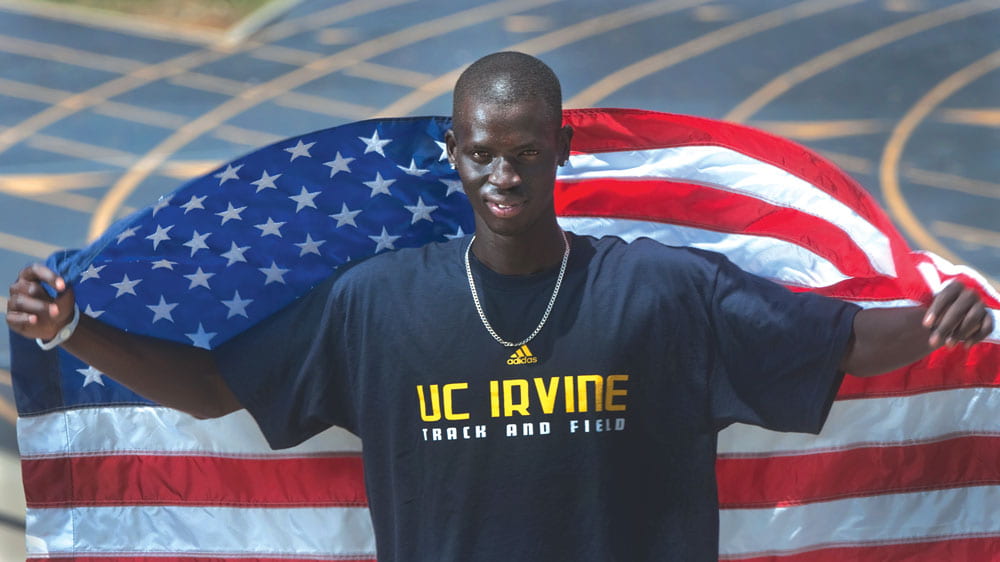
Among other noteworthy Olympians: Greg Louganis ’83, who captured four gold medals and one silver medal in diving over four Olympic Games, and Steve Scott ’78, who competed in track and field in 1984 and 1988 and – like Louganis – was a member of the U.S. team that boycotted the 1980 Games. Scott won four individual NCAA championships in the 1,500 meters and the mile while at UCI. Charles Jock ’12, an NCAA champion in the 800, ran at the 2016 Olympics in Rio de Janeiro, where former men’s volleyball All-American David Smith ’07 competed in his second consecutive Olympics and won a bronze medal.
Two Paralympians are also Anteater Olympians. Nick Scandone ’90, who was an All-American sailor and member of UCI’s 1988 national championship team, narrowly missed participating on the U.S. team in 1992. Later diagnosed with Lou Gehrig’s disease, he began training for the Paralympics. He was selected by his peers to carry the flag for the U.S. delegation in the 2008 opening ceremonies and went on to win gold in the SKUD 18 class with crewmate Maureen McKinnon-Tucker.
John Morgan ’87, a blind swimmer, won 13 gold medals across two Paralympic Games, including five golds in 1984. At the 1992 Summer Paralympics in Barcelona, Spain, he set six world records and two Paralympic records in winning eight gold medals and two silver.

Ted Newland (second from left).
“Competing at the highest level, whether on the course or in the classroom, is what makes UCI impressive.”
Snout Shout-Out
Among the elements that make UCI Athletics unique is its mascot. An anteater based on a character in the “B.C.” comic strip defeated the roadrunner and the unicorn, among others, in a vote by 1,000 students in November of 1965. Peter the Anteater has resonated with even casual college sports fans, spawning the dawn of ’Eater Nation references and Zot! Zot! Zot! chants and hand signals (based on the sound the “B.C.” anteater makes when snaring prey). Two digital platforms ranked him No. 1 among mascots for 68 NCAA men’s basketball tournament teams in 2019.
“It’s not even close,” hoops coach Turner responded to a media inquiry during a March Madness press conference in San Jose. “We have the best mascot, I believe. There are no other anteaters anywhere. We’re unique. We’re fun. We get people’s attention, and I love that.”
And the critter seems to give student-athletes a special boost too. “The Anteater becomes part of you,” notes women’s volleyball head coach Ashlie Hain ’04, who helped lift UCI to two NCAA appearances as an athlete and over the last two seasons has guided the squad to two postseason appearances. “You embrace it and own the fact that you are unique.”
That’s all part of UCI’s special shine, some alumni say.
“I wouldn’t be in the position I’m in now if it weren’t for UCI Athletics,” says Scott Brooks, former collegiate and pro basketball player and current head coach of the Washington Wizards who came back to complete his degree in 1996. “My mom raised me to give back and don’t always take. Irvine has given me so much, enabling me not only to be an NBA player and coach, but also to have the life skills to be successful off the court.”
On the heels of its latest triumphant achievement, UCI Athletics is working hard to create many more shining moments and futures.
“My UCI experience has given me amazing opportunities to grow as a person physically, spiritually and mentally,” says senior women’s volleyball player Idara Akpakpa. “I’m excited for all of the adventures that I have ahead of me.”
Originally published in the Spring 2019 issue of UCI Magazine.
